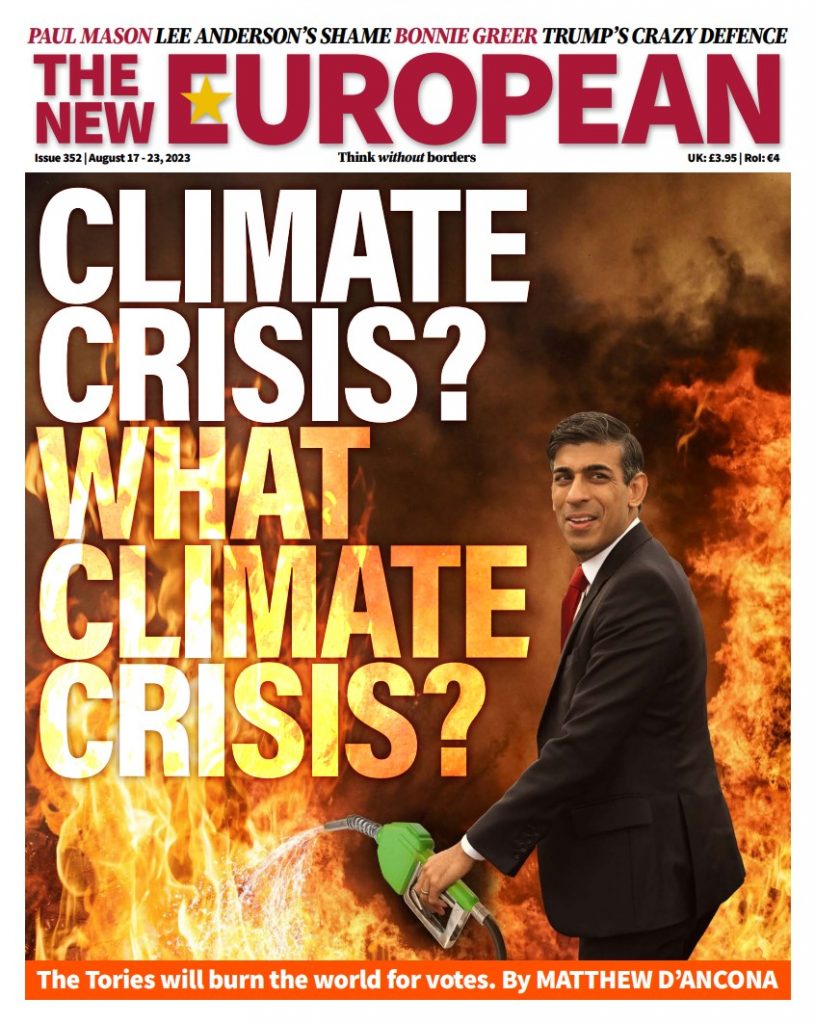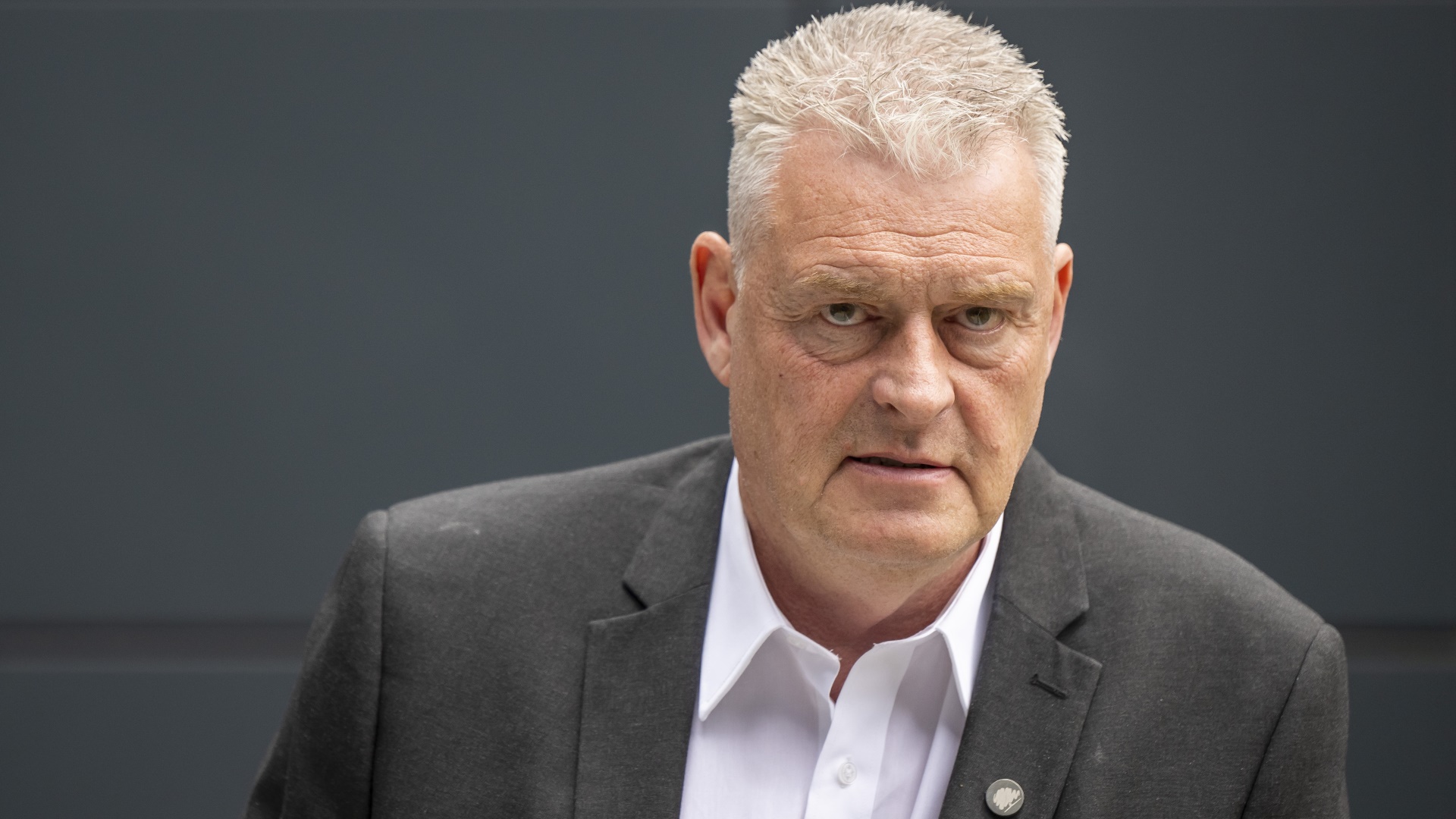In “The Tories weaponising racist rage for votes damages them.. and Britain” (TNE #352), Paul Mason says Rishi Sunak has made a “huge mistake” in giving Lee Anderson a prominent role and carte blanche to say what he likes. This explains why they keep winning and we keep losing.
The Conservatives do not care what damages their brand or damages the country. They simply care about winning power and retaining the privilege that goes with power. They will throw any old muck out there to do so and hope that some of it sticks.
Meanwhile, the opposition issues tame refutations and we liberals wring our hands about wrestling with pigs, or issue well-meaning but politically disastrous maxims like “when they go low, we go high”. No one takes on Lee Anderson and what he stands for in the kind of language Lee Anderson stands for, and the result is that his beliefs leak into the mainstream and eventually become mainstream beliefs.
Jane Parsons
Everything about Lee Anderson is depressing, but perhaps most depressing of all is this: where is the backlash against him from those on the left of the Conservative Party? Where is the “sensible Tory” breakaway party?
Sarah Mann
Brighton, Sussex
Anderson is so, so ignorant and presumably so, so proud of it. In his arrogance and his lack of consideration for anyone outside his circle, he represents everything that most of the world despises the UK for.
Art Murfitt
Barging ahead
Re: Mitch Benn’s reworking of The Love Boat (TNE #352). Now that the Tories think it’s a good idea to house people on a barge, perhaps they should moor a similar barge on the Thames by the Houses of Parliament to accommodate MPs and Lords. It would save the taxpayer millions in expenses.
John Loughlin
Via Facebook
Tarred
Re the “Grow Up” letter in TNE #352, on use of the term “nicotine-stained man-frog” to describe Nigel Farage. Jane Valentine is probably right to call out Alastair Campbell for his language here, especially as nicotine is colourless and the staining he is referring to is caused by tar instead.
David Hill (medic)
Glasgow, Scotland
Join the dots
Re: Mandrake’s coverage of the National Rejoin March (TNE #352). I feel that a mistake is being made, and an opportunity being missed, by using the word “rejoin” for the demonstration planned for September in London, and for the pro-European campaign generally. The word “join” would be so much better.
“Rejoin” has four implications. First, that the UK was once a member of the EU; second, that the UK chose to leave the EU; third, that Britons subsequently realised that as a nation they had made a mistake; and fourth, that it sought to rectify the mistake by “rejoining” the EU. The latter two implications are problematic. Using the word “rejoin” obliges people, particularly those who voted Leave, to confront the fact that the nation has made a mistake that needs to be rectified.
The slogan “Join the EU” avoids the pain and division of the Brexit years; there is no implication of a mistake, no guilt for Leave-voters, no triumphalism for Remain-voters, no suggestion of “reversing Brexit”, “overturning the will of the people”, or “re-fighting old battles”. Britain will simply be like any other aspiring member-nation: a nation that is looking to the future and that sees a clear advantage in joining the EU.
Adrian Hackford
Lyminge, Kent
Pumped up
I really enjoy your front covers – but isn’t there a problem with the one from TNE #352? I understood that Rishi Sunak didn’t know how to operate a petrol pump…
Phil Green

Bad dream
I’ve just read Richard Holledge’s article about Dürer (“The prince of prints”, TNE #352) which refers to Martin Luther King denouncing Catholicism in 1520.
Call me pedantic, but I think it was plain old Martin Luther.
Amanda Counsell
Low society
Will Self’s “… on Braverman” column (TNE #352) was commendable. Regarding the home secretary’s desire to “hunt down and lock up” some people on the streets, I’d only add that she might reflect on the idea that probably most of those she wants to lock up have grown through adolescence into adulthood within the last 13 years of Conservative governments, and that some of the behaviours she objects to may be to do with how a government manages society.
Ah, silly me, I was forgetting that there’s no such thing as society. [Margaret Thatcher, 1987].
Andrew Rolph
Bradford on Avon, Wiltshire
Bad old days
Re: Jonty Bloom’s article “Welcome back to the 1950s” (TNE #352). Brexiteers nostalgic for the 1950s never saw the look on my mother’s face when we moved into a house with a proper bathroom. That was gracious living for working people. My grandmother used to walk a half mile in each direction to share this bathroom, a miracle of modern plumbing.
A cousin died because the asthma medication that could have saved him had not been invented yet.
Good old days be damned.
Don Adamson
Bradford, West Yorkshire
Power point
In his letter adding to your ongoing debate about renewable energy (TNE #352), Brian Pollard claims “this country lacks the resources to produce renewable energy for more than a small fraction of the energy we currently consume” and notes that “the laws of physics have not changed” since a book he cites was written in 2009.
Where he is in error is in confusing the laws of physics with advances in technology. When the book was written, our ability to harvest wind power, for example, was much less than it is today.
Back then the total offshore capacity was estimated at 76GW. Nowadays our own not-at-all-green government notes that there are 14GW of offshore wind already installed and around 77GW across 80 projects that are either “in construction, consented, in development and planned in future seabed leasing auctions”.
For reference, current electricity usage peaks at around 40GW, and so soon on a windy day we should be able to cover this twice over with offshore wind power alone. This is just one of several low-emission energy technologies, some of which are also growing fast as their costs are falling.
Oli Griffiths
London SW17
Brian Pollard is correct – we will need oil and gas for a couple of decades to come. So I was disappointed with Matthew d’Ancona jumping on the populist media bandwagon of decrying the government’s energy security policies (“The Eurosceptics are now ecosceptics.. this time, they will wreck the planet”, TNE #352).
I agree with little our government does, but they are correct to promote carbon capture and storage as well as nuclear. We need more of both to meet our climate change target.
Norman Harris
Croydon, Greater London
A link too far
Nigel Warburton (“Knowing Yourself”, TNE #352) seems to accept that Netflix “knew” a girl was bisexual before she did. I think this is a fear-inspiring misunderstanding of current AI capabilities. The danger is from the people accessing her information.
AIs that sell products create two sets of associations each time you make a choice – direct and indirect. For instance, if I choose a song by Shirley Bassey, it will create a weak association with other songs by her, with James Bond themes and with emotional ballads etc.
Apparently, Bassey is a gay icon. When the AI creates indirect associations of the type “people who purchased A also purchased X, Y and Z”, many of the X, Y and Zs will therefore be choices of gay people. My future choices will strengthen or weaken each of these associations. If I am subconsciously or consciously gay I will buy lots of the “gay” choices presented to me.
The AI works out what products I like only because that is what I am telling it; it doesn’t know what gay means. I may eventually decide “I am bi/gay/”, but the AI has no idea.
Peter Basford
Re: Nigel Warburton’s column on bystanding (TNE #351). If you see a rough sleeper, you should use StreetLink to report their presence to local authorities, who will send the proper assistance. The URL is streetlink.org.uk
Owen Southwood
Via Facebook
Back to land
I was heartened to see in TNE #351 a letter supporting land value taxation (LVT). By implementing this, a future Labour government could raise money to fund a reduction in the cost of social housing.
There is some fear from houseowners about the impact that LVT would have on them, but the vast majority of the population that live in small dwellings with low rental value will be largely unaffected. What it will impact is land and property owners living in high-value areas.
Basing LVT on the rental value of land means that all those properties in Kensington worth millions will have to pay proportionately more than, say, somewhere in Somerset. All the big landowners with inherited land will have to start paying for the privilege of owning it. At the moment they can raise money for themselves through government grants without having to lift a finger.
Gail Coleshill
Crewkerne, Somerset
Renewal
Simon Barnes (“How big money broke Britain”, TNE #351) describes very well how damaging it is to put the making of money above all other considerations, but offers no solutions. His article poses one of humanity’s most profound questions: how do we best ensure that we live safe, sane and beautiful lives?
This is in essence what the world’s religions have been asking, and answering, for thousands of years.
Of course, many these days have no religion. So, in the absence of other ways to measure the value of people’s conduct, applying monetary values in the free market is just about all that is left. Which in turn leads governments to try to achieve the impossible: constant year-on-year growth of GDP indefinitely, irrespective of the material resources available for that.
And the gaping hole in that approach is that anything that cannot be given a clear financial value is treated as having none.
The looming crisis is the need for the entire world to live sustainably, never consuming more than can be replaced by naturally renewing resources. That is an imperative that the world has to face up to, and soon. When it does, Simon’s question will get an answer of sorts. It would be much better to get one that we want now.
Richard H Burnett-Hall
London W11



